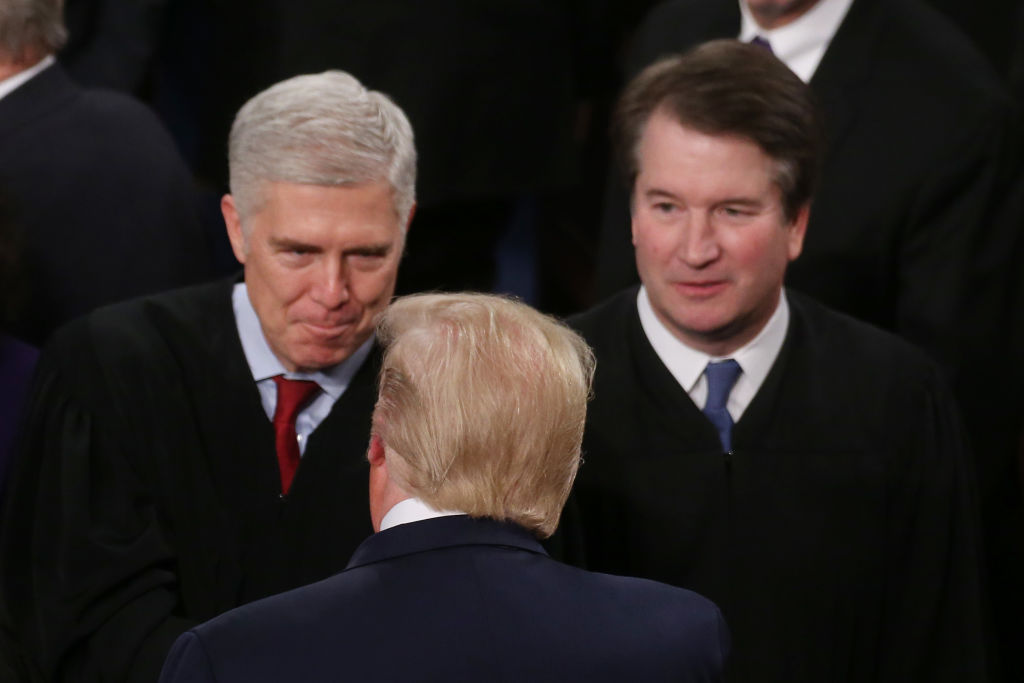Justice Kavanaugh seems to argue no votes should be counted after Election Day. He may get his wish in key states.


A free daily email with the biggest news stories of the day – and the best features from TheWeek.com
You are now subscribed
Your newsletter sign-up was successful
The Supreme Court sided with Republicans in Wisconsin on Monday, ruling 5-3 along ideological lines that Wisconsin can count only those absentee ballots that arrive by Election Day — even if they were mailed days earlier. Since first-class mail has been taking an average of 10 days to be delivered in the state, Wisconsin's Democratic Party urged mail-in Democrats to hand-deliver their absentee ballots or vote in person.
The practical issue involves what happens with Wisconsin's 700,000 outstanding absentee ballots. "But the deeper issue is about the extent to which a ballot should be considered as valid," Phillip Bump writes in The Washington Post. In a factually sloppy concurring opinion, Justice Brett Kavanaugh evidently embraced President Trump's baseless conspiracies about voter fraud and bizarre demand that the winner be announced election night.
Many states require absentee ballots to arrive by Election Day because they "want to avoid the chaos and suspicions of impropriety that can ensue if thousands of absentee ballots flow in after election day and potentially flip the results of an election," Kavanaugh wrote. "And those states also want to be able to definitively announce the results of the election on election night, or as soon as possible thereafter."
The Week
Escape your echo chamber. Get the facts behind the news, plus analysis from multiple perspectives.

Sign up for The Week's Free Newsletters
From our morning news briefing to a weekly Good News Newsletter, get the best of The Week delivered directly to your inbox.
From our morning news briefing to a weekly Good News Newsletter, get the best of The Week delivered directly to your inbox.
Justice Elena Kagan, in her dissent, noted that "there are no results to 'flip' until all valid votes are counted. And nothing could be more 'suspicio[us]' or 'improp[er]' than refusing to tally votes once the clock strikes 12 on election night."
More broadly, Kavanaugh — and Justice Neil Gorsuch — embraced late Chief Justice William Rehnquist's concurring opinion in 2000's Bush v. Gore, which invented a legal theory "so radical, so contrary to basic principles of democracy and federalism, that two conservative justices" rejected it, even as they agreed to hand the White House to George W. Bush in what was supposed to be a one-off decision, Mark Joseph Stern writes at Slate.
Rehnquist argued that state courts cannot interpret state election laws in federal elections, Stern writes, "a breathtaking assault on state sovereignty" that would transform the Supreme Court "into a national board of elections with veto power over each state's election rules." With Judge Amy Coney Barrett on the court, the conservatives likely have five votes to enact Rehnquist's theory, throwing out ballots in Pennsylvania and North Carolina as well as Wisconsin, he added. "In other words, Barrett's first decisions as a justice may determine the outcome of the election."
A free daily email with the biggest news stories of the day – and the best features from TheWeek.com
Peter has worked as a news and culture writer and editor at The Week since the site's launch in 2008. He covers politics, world affairs, religion and cultural currents. His journalism career began as a copy editor at a financial newswire and has included editorial positions at The New York Times Magazine, Facts on File, and Oregon State University.
-
 Political cartoons for February 19
Political cartoons for February 19Cartoons Thursday’s political cartoons include a suspicious package, a piece of the cake, and more
-
 The Gallivant: style and charm steps from Camber Sands
The Gallivant: style and charm steps from Camber SandsThe Week Recommends Nestled behind the dunes, this luxury hotel is a great place to hunker down and get cosy
-
 The President’s Cake: ‘sweet tragedy’ about a little girl on a baking mission in Iraq
The President’s Cake: ‘sweet tragedy’ about a little girl on a baking mission in IraqThe Week Recommends Charming debut from Hasan Hadi is filled with ‘vivid characters’
-
 Rubio boosts Orbán ahead of Hungary election
Rubio boosts Orbán ahead of Hungary electionSpeed Read Far-right nationalist Prime Minister Viktor Orbán is facing a tough re-election fight after many years in power
-
 Key Bangladesh election returns old guard to power
Key Bangladesh election returns old guard to powerSpeed Read The Bangladesh Nationalist Party claimed a decisive victory
-
 Epstein files topple law CEO, roil UK government
Epstein files topple law CEO, roil UK governmentSpeed Read Peter Mandelson, Britain’s former ambassador to the US, is caught up in the scandal
-
 Iran and US prepare to meet after skirmishes
Iran and US prepare to meet after skirmishesSpeed Read The incident comes amid heightened tensions in the Middle East
-
 EU and India clinch trade pact amid US tariff war
EU and India clinch trade pact amid US tariff warSpeed Read The agreement will slash tariffs on most goods over the next decade
-
 Israel retrieves final hostage’s body from Gaza
Israel retrieves final hostage’s body from GazaSpeed Read The 24-year-old police officer was killed during the initial Hamas attack
-
 China’s Xi targets top general in growing purge
China’s Xi targets top general in growing purgeSpeed Read Zhang Youxia is being investigated over ‘grave violations’ of the law
-
 Panama and Canada are negotiating over a crucial copper mine
Panama and Canada are negotiating over a crucial copper mineIn the Spotlight Panama is set to make a final decision on the mine this summer
